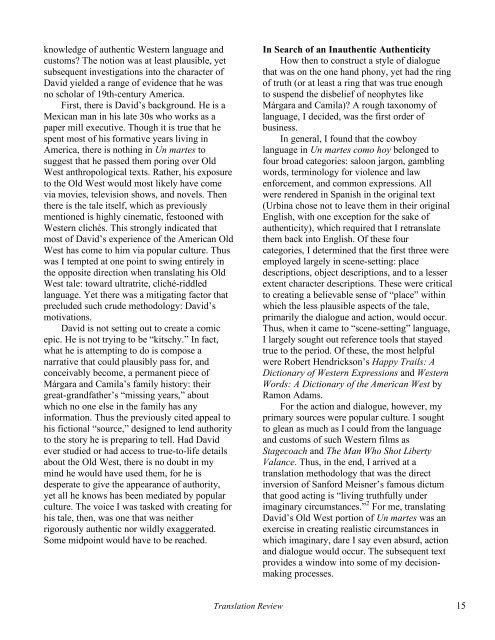table of contents - The University of Texas at Dallas
table of contents - The University of Texas at Dallas
table of contents - The University of Texas at Dallas
Create successful ePaper yourself
Turn your PDF publications into a flip-book with our unique Google optimized e-Paper software.
knowledge <strong>of</strong> authentic Western language and<br />
customs? <strong>The</strong> notion was <strong>at</strong> least plausible, yet<br />
subsequent investig<strong>at</strong>ions into the character <strong>of</strong><br />
David yielded a range <strong>of</strong> evidence th<strong>at</strong> he was<br />
no scholar <strong>of</strong> 19th-century America.<br />
First, there is David’s background. He is a<br />
Mexican man in his l<strong>at</strong>e 30s who works as a<br />
paper mill executive. Though it is true th<strong>at</strong> he<br />
spent most <strong>of</strong> his form<strong>at</strong>ive years living in<br />
America, there is nothing in Un martes to<br />
suggest th<strong>at</strong> he passed them poring over Old<br />
West anthropological texts. R<strong>at</strong>her, his exposure<br />
to the Old West would most likely have come<br />
via movies, television shows, and novels. <strong>The</strong>n<br />
there is the tale itself, which as previously<br />
mentioned is highly cinem<strong>at</strong>ic, festooned with<br />
Western clichés. This strongly indic<strong>at</strong>ed th<strong>at</strong><br />
most <strong>of</strong> David’s experience <strong>of</strong> the American Old<br />
West has come to him via popular culture. Thus<br />
was I tempted <strong>at</strong> one point to swing entirely in<br />
the opposite direction when transl<strong>at</strong>ing his Old<br />
West tale: toward ultr<strong>at</strong>rite, cliché-riddled<br />
language. Yet there was a mitig<strong>at</strong>ing factor th<strong>at</strong><br />
precluded such crude methodology: David’s<br />
motiv<strong>at</strong>ions.<br />
David is not setting out to cre<strong>at</strong>e a comic<br />
epic. He is not trying to be “kitschy.” In fact,<br />
wh<strong>at</strong> he is <strong>at</strong>tempting to do is compose a<br />
narr<strong>at</strong>ive th<strong>at</strong> could plausibly pass for, and<br />
conceivably become, a permanent piece <strong>of</strong><br />
Márgara and Camila’s family history: their<br />
gre<strong>at</strong>-grandf<strong>at</strong>her’s “missing years,” about<br />
which no one else in the family has any<br />
inform<strong>at</strong>ion. Thus the previously cited appeal to<br />
his fictional “source,” designed to lend authority<br />
to the story he is preparing to tell. Had David<br />
ever studied or had access to true-to-life details<br />
about the Old West, there is no doubt in my<br />
mind he would have used them, for he is<br />
desper<strong>at</strong>e to give the appearance <strong>of</strong> authority,<br />
yet all he knows has been medi<strong>at</strong>ed by popular<br />
culture. <strong>The</strong> voice I was tasked with cre<strong>at</strong>ing for<br />
his tale, then, was one th<strong>at</strong> was neither<br />
rigorously authentic nor wildly exagger<strong>at</strong>ed.<br />
Some midpoint would have to be reached.<br />
In Search <strong>of</strong> an Inauthentic Authenticity<br />
How then to construct a style <strong>of</strong> dialogue<br />
th<strong>at</strong> was on the one hand phony, yet had the ring<br />
<strong>of</strong> truth (or <strong>at</strong> least a ring th<strong>at</strong> was true enough<br />
to suspend the disbelief <strong>of</strong> neophytes like<br />
Márgara and Camila)? A rough taxonomy <strong>of</strong><br />
language, I decided, was the first order <strong>of</strong><br />
business.<br />
In general, I found th<strong>at</strong> the cowboy<br />
language in Un martes como hoy belonged to<br />
four broad c<strong>at</strong>egories: saloon jargon, gambling<br />
words, terminology for violence and law<br />
enforcement, and common expressions. All<br />
were rendered in Spanish in the original text<br />
(Urbina chose not to leave them in their original<br />
English, with one exception for the sake <strong>of</strong><br />
authenticity), which required th<strong>at</strong> I retransl<strong>at</strong>e<br />
them back into English. Of these four<br />
c<strong>at</strong>egories, I determined th<strong>at</strong> the first three were<br />
employed largely in scene-setting: place<br />
descriptions, object descriptions, and to a lesser<br />
extent character descriptions. <strong>The</strong>se were critical<br />
to cre<strong>at</strong>ing a believable sense <strong>of</strong> “place” within<br />
which the less plausible aspects <strong>of</strong> the tale,<br />
primarily the dialogue and action, would occur.<br />
Thus, when it came to “scene-setting” language,<br />
I largely sought out reference tools th<strong>at</strong> stayed<br />
true to the period. Of these, the most helpful<br />
were Robert Hendrickson’s Happy Trails: A<br />
Dictionary <strong>of</strong> Western Expressions and Western<br />
Words: A Dictionary <strong>of</strong> the American West by<br />
Ramon Adams.<br />
For the action and dialogue, however, my<br />
primary sources were popular culture. I sought<br />
to glean as much as I could from the language<br />
and customs <strong>of</strong> such Western films as<br />
Stagecoach and <strong>The</strong> Man Who Shot Liberty<br />
Valance. Thus, in the end, I arrived <strong>at</strong> a<br />
transl<strong>at</strong>ion methodology th<strong>at</strong> was the direct<br />
inversion <strong>of</strong> Sanford Meisner’s famous dictum<br />
th<strong>at</strong> good acting is “living truthfully under<br />
imaginary circumstances.” 2 For me, transl<strong>at</strong>ing<br />
David’s Old West portion <strong>of</strong> Un martes was an<br />
exercise in cre<strong>at</strong>ing realistic circumstances in<br />
which imaginary, dare I say even absurd, action<br />
and dialogue would occur. <strong>The</strong> subsequent text<br />
provides a window into some <strong>of</strong> my decisionmaking<br />
processes.<br />
Transl<strong>at</strong>ion Review 15

















